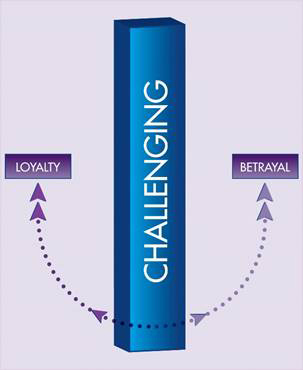When asked for my one piece of leadership advice it was easy for me to quickly respond with bring your “human kindness” into the workplace when leading others.
What’s the story behind this choice?
 For years business leaders have been told how important it is to be professional and that there is no place for emotion in the workplace. Leaders I speak to continue to “believe” this story in its many forms but ultimately with the same message – put on your leadership persona when you walk into the workplace.
For years business leaders have been told how important it is to be professional and that there is no place for emotion in the workplace. Leaders I speak to continue to “believe” this story in its many forms but ultimately with the same message – put on your leadership persona when you walk into the workplace.
We have also been told and consistently reminded not to be “too friendly” Why is this? Because it clouds your judgement, it blurs the lines of accountability and can mean you go “soft” on people.
We have even gone as far as labelling this capability – to be friendly, to be human, to care and to encourage – as “soft skills”. Let’s take a moment to reflect on this – what leader wants to be labelled soft?
Especially when leaders are increasingly being held accountable for hard KPIs every quarter – the focus is short term and they remain under threat of retaining their organisational position and maintaining the remuneration that they and their family have based their security on. Bottom line performance that informs share price continues to be the critical measure.
Why would you consider taking this advice?
There are five critical considerations you would benefit from thinking about:
1. Concern for people
We need leaders as human “beings” and not humans “doing” – we have experienced leaders with a strong focus on completing tasks, getting stuff done and achieving results. Now more than ever leaders and their teams are going to benefit from a stronger focus on being more human as we:
- recover out of the current crisis
- face the economic downturn
- work out how to deal with the impending AI revolution we keep hearing about and increasingly experience. Thought Leaders have continued to tell us we don’t need to feel threatened by AI as it gives us space to be “more human”.
These are not new concepts – leaders have always faced the tension between:
- bringing a focus on people or a focus on the task
- the need for control or the opportunity to empower others
- short term results to satisfy short term expectations and long term sustainability
2. Enables deep connection
Take a few moments to acknowledge that to “be” human and bring kindness into business:
- takes courage (because it hasn’t been the norm)
- requires trust (in each other – your integrity and intent must both “be” real while being perceived by others to be real)
- involves high levels of vulnerability – as you are not going to know how people will respond to your actions.
We have seen the New Zealand Prime Minister, Jacinda Ardern bring such humanness to leadership……….and we have witnessed the deep global and local connection this has enabled.
3. Acknowledge a real place for emotion
When you acknowledge the place for emotion, you dismiss the myth about being “professional” and business-like and instead recognise that being human and bringing kindness means being OK with emotion and this enables the deeper connection. Just as we have seen Jacinda Ardern demonstrate, there is a place for emotion in a leader and in a workplace. It is what connects us as human beings coming together for a common purpose. It is what makes us feel like we belong and feel inspired to get things done.
4. Kindness is not soft – it is about telling the truth
Kindness means telling the truth, it means showing genuine respect and care and it is not about just being warm and fuzzy and NICE. Two weeks prior to getting started on one of our 12-day leadership programs with a client, the CEO came to me and said I want my leadership team to stop being so “nice” to each other. We looked at each other and laughed and he said let me tell you what I mean – I want them to stop following the “nice mantra:”
N = Nothing
I = In me
C = Cares
E = Enough…
…to tell you the truth!
Instead I will tell you what I think you want to hear, need to hear and I will hold the truth to myself or tell it to others behind your back! What this means is a passive culture of people being nice and actually limiting performance and connection.
Kindness is about giving honest feedback, having the conversations you really need to have for all of you to perform at your best and “be” at your best. It is interesting that we all recall the saying that “you have to be cruel to be kind” – and what is this telling us? That we have told ourselves inadvertently and subconsciously that telling the truth is cruel. So we have convinced ourselves not to tell the truth and rather protect others from the cruelty of our truth.
This brings us to another realisation – there is nothing SOFT about bringing kindness into the workplace as a leader – it is “hard”. It takes courage, trust and vulnerability as we referred to earlier.
5. Competitive advantage
Lastly we encourage you to deeply consider re-framing your competitive advantage as “being more human”. Make this choice and what would this look like:
- Internally for your team and how individuals work together
- Externally for your customers and the experiences you create for them
- Externally with your supply chain partners to bring the experiences/products to your customers/clients.
Lots to consider as you decide to shift away from the binary focus on either task or people, bottom line or being human – can we find a better balance? Does it have to be so binary?
How can I get started?
In the next week challenge yourself to “be” a human by choosing one of these 5 things to focus on:
- Bringing emotion to work – sharing your feelings and asking others to share theirs
- Empathising with others – as you listen when they share feelings and facts about their situation, get into their shoes and deeply appreciate what life must be like for them
- Be kind to others – smile, say thank you, express gratitude, show compassion, demonstrate care
- Trust others – remember the wise words of Lao Tzu; “No trust given, no trust received”
- Embrace and own your vulnerability – don’t pretend you are OK, don’t pretend you have all the answers, don’t pretend that the business is going to be OK, instead speak the truth.
I leave you with the wise words of the Dalai Lama:
“People were created to be loved. Things were created to be used.
The reason why the world is in chaos is because things are being loved and people are being used.”
When people feel like they matter, when they feel significant, they perform at their best and this benefits your customers/clients and your bottom line.
So you are encouraged to bring your human kindness to your workplace tomorrow and start noticing the difference!
Want to talk more about this? Contact Us.










